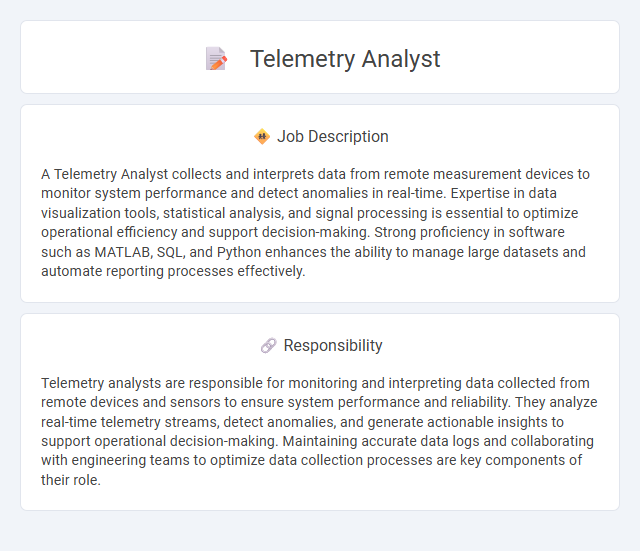
A Telemetry Analyst collects and interprets data from remote measurement devices to monitor system performance and detect anomalies in real-time. Expertise in data visualization tools, statistical analysis, and signal processing is essential to optimize operational efficiency and support decision-making. Strong proficiency in software such as MATLAB, SQL, and Python enhances the ability to manage large datasets and automate reporting processes effectively.
Individuals with strong analytical skills and an interest in data interpretation are likely to thrive as telemetry analysts. Candidates comfortable with technology and detail-oriented tasks may find this role suitable, as it demands continuous monitoring and accurate reporting of system performance. Those who struggle with prolonged screen time or high-pressure decision-making might face challenges in adapting to the job's demands.
Qualification
A Telemetry Analyst typically requires a strong background in data analysis, computer science, or engineering, with proficiency in programming languages such as Python, R, or SQL to interpret telemetry data accurately. Candidates should demonstrate expertise in statistical methods, data visualization tools, and experience with telemetry systems in industries like aerospace, telecommunications, or healthcare. Advanced qualifications often include a bachelor's or master's degree in a related field, alongside certifications in data analytics or specialized telemetry software.
Responsibility
Telemetry analysts are responsible for monitoring and interpreting data collected from remote devices and sensors to ensure system performance and reliability. They analyze real-time telemetry streams, detect anomalies, and generate actionable insights to support operational decision-making. Maintaining accurate data logs and collaborating with engineering teams to optimize data collection processes are key components of their role.
Benefit
A telemetry analyst role likely offers significant benefits including access to real-time data insights that enhance decision-making and operational efficiency. The position probably provides opportunities for skill development in data analysis and technology, which are valuable across many industries. Employees in this role may also enjoy competitive salaries and growth potential due to increasing demand for telemetry expertise.
Challenge
Telemetry analyst roles likely demand strong analytical skills to interpret large volumes of real-time data accurately. The challenge probably lies in identifying patterns and anomalies quickly to support timely decision-making. Adapting to rapidly evolving technology and complex data streams might also be a significant aspect of the job difficulty.
Career Advancement
Telemetry analysts gain valuable skills in data collection, signal processing, and trend analysis essential for monitoring remote systems and devices. Mastery of advanced telemetry software and real-time data interpretation can lead to roles such as senior analyst, data scientist, or systems engineer, enhancing career prospects in aerospace, healthcare, and telecommunications industries. Continuous upskilling in machine learning and cloud-based telemetry platforms significantly accelerates professional growth and leadership opportunities.
 kuljobs.com
kuljobs.com